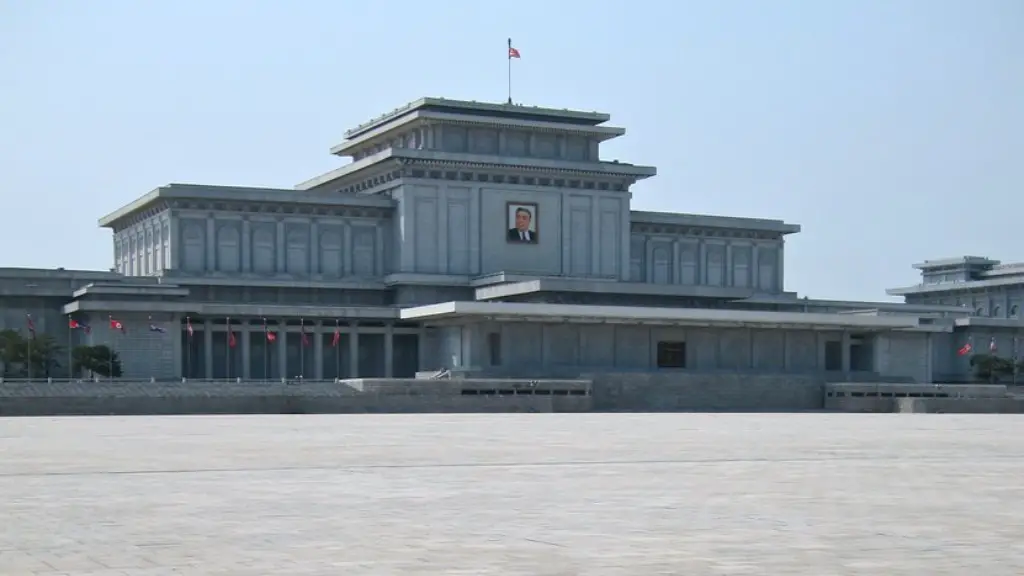Political Climate
After Japan was forced from the Korean Peninsula at the end of World War II, Korea found itself divided into two separate states, North and South Korea. The two were separated along the 38th parallel due to the differing ideologies of the United States and the Soviet Union. The U.S. quickly recognized South Korea as an independent state, while the Soviets supported the communist North.
The immediate postwar period saw both North and South Korea vie to gain control of the entire peninsula. North Korea was backed by China and the Soviet Union, while South Korea was backed by the United States and a number of other western countries. The tensions between the two sides ultimately resulted in the Korean War of 1950-1953.
The war ended in an uneasy truce, with no clear victor. North Korea emerged from the war a heavily militarized state, and much more overtly Marxist-Leninist in its ideology, which ultimately set the stage for its emergence as a fully communist state.
Stalin’s Influence
One of the primary influences on North Korea’s march toward communism was Soviet leader Joseph Stalin, who gave Kim Il-Sung, the leader of North Korea, concrete assistance during and after the Korean War. Stalin quickly sought to make North Korea a part of the broader ‘Socialist camp’ by helping to establish a number of organizations in the region, such as the Korean Workers’ Party and the Korean People’s Army.
Stalin’s actions had a profound impact on North Korea, as the country received substantial amounts of aid from both the Soviet Union and China while rapidly building its infrastructure, public education, and economy. Moreover, the seeds of North Korean communism were firmly planted by Stalin, who worked to indoctrinate North Korea’s population with Marxist-Leninist ideology.
Resistance to Capitalism
The Korean War was a major factor in North Korea’s decision to turn to communism, as the country’s fraught relationship with the capitalist West only deepened during and after the conflict. Often viewed as a direct proxy for the Cold War between the United States and the Soviet Union, North Korea quickly sought to demonstrate its allegiance to the communist bloc.
By aligning itself with communist countries such as China and the Soviet Union, North Korea was able to reap the economic and political benefits which included economic aid and the protection of its borders from capitalist nations. This alignment with the communist bloc allowed North Korea to further solidify its status as a one-party, socialist state.
Propaganda and Control
In order to fully entrench communism in North Korea, the government relied heavily on propaganda and control of the media and public information. Through most of its history, North Korea has lived under the rule of the Kim family dynasty and the state has used this long-term control to its advantage.
The state has manipulated the media in order to present North Korea as the epitome of a perfect communist society while demonizing the West and its capitalist systems. This relentless propaganda has led to a tightly controlled society in which the citizens are educated to believe that North Korea is the only true source of liberty and justice.
Lack of Exposure to Alternative Ideologies
One of the primary reasons why North Korea has become such an entrenched communist state is due to the lack of exposure to alternative ideologies. North Koreans have lived in a state of virtual isolation for decades and have been exposed to only one ideology: that of the North Korean state.
The lack of access to outside information has allowed the North Korean regime to manipulate the population into a state of loyalty and obedience to the state and its ruling family. This lack of access to alternative ideologies has helped to ensure the continued dominance of communism in North Korea and has made it almost impossible for alternative ideologies to take root.
Economic Hardship
Finally, the economic hardships experienced by the people of North Korea have contributed to the country’s embrace of communism. Over the last few decades, North Korea has lagged behind much of the rest of the world as a result of mismanagement of resources and economic exploitation of the people by the state.
The economic crisis in North Korea has led to a feeling of desperation amongst the population, and this desperation has only been compounded by the growing inequality between the ruling class and the working class. As a result, many North Koreans have come to view communism as a viable alternative to the economic woes that have plagued the country for decades.
Effects of International Pressure
Since the end of the Cold War, international pressure has seen North Korea become further entrenched in its communist ideology. The nation has seen itself isolated from the rest of the world, with the United States and its allies placing sanctions on the country and the United Nations passing numerous resolutions to put pressure on the regime.
The North Korean regime has responded to this international pressure by doubling down on its Marxist-Leninist rhetoric, with harsh punishments meted out to people believed to be opposing the regime or its ideology. This has only further strengthened North Korea’s commitment to communism and made it even more difficult for other ideologies to gain any sort of foothold in the country.
Political Rigidity
Finally, the political rigidity of the North Korean government has further entrapped the country in its communist ideology. The North Korean leadership has shown no signs of loosening its grip on power and has gone to great lengths to ensure that it remains in control.
By repressing dissent, severely limiting access to information, and maintaining an oppressive security apparatus, the North Korean regime has been able to remain in power and keep its citizens in a perpetual state of servitude. This tight control and lack of democratic reform has been instrumental in ensuring North Korea’s embrace of communism as the core ideology of the nation.
Impact on the Korean Peninsula
North Korea’s commitment to communism has had a massive impact on the Korean Peninsula. The split between the two states has prevented the reunification of the peninsula and has led to an unstable status quo that has reverberated throughout East Asia.
The North Korean regime’s focus on maintaining its Marxist-Leninist ideology and its hostility toward the West has led to numerous military confrontations, economic sanctions, and diplomatic standoffs, all of which have destabilized the region and threatened the peace and security of its neighbors.
International Sanctions and Deterrence
The international community has responded to North Korea’s commitment to communism through sanctions and a policy of deterrence. The United Nations has imposed a number of economic sanctions on North Korea in an effort to force the regime to relax its grip on power and open up the country to outside influences.
The United States has maintained a policy of deterrence against North Korea, engaging in joint military exercises with its allies in the region, such as South Korea and Japan, in order to demonstrate its commitment to the defense of the region.
Regime Change and Stability
Although the international community has made strides in curbing North Korea’s commitment to communism, it is unclear if North Korea can ever be coaxed away from its Marxist-Leninist ideology. A regime change would likely be necessary in order to bring about a more stable and prosperous Korean Peninsula, but it remains to be seen if such a change will ever be possible.
As long as North Korea remains committed to its communist ideology, the Korean Peninsula will remain in a state of flux and the prospects for peace and prosperity in the region will remain uncertain.
North Korean Nuclear Program
North Korea’s commitment to communism has been a major contributing factor to its nuclear weapons program, as the state has sought to ensure its security by developing a nuclear deterrent. North Korea has made it clear that it will never capitulate to the international community’s demands to abandon its nuclear program and has instead used the program as a way to both deter potential attackers and exert its power over its neighbors.
Although the international community has been able to slow down the development of North Korea’s nuclear program through sanctions and diplomatic pressure, the program continues to be a major source of tension in the region and is likely to remain a vexing problem for the foreseeable future.
Effects on North Korean Society
North Korea’s commitment to communism has had a major effect on its society, leading to widespread poverty, human rights abuses, and an absence of basic freedoms. The North Korean government has gone to great lengths to silence dissent and to keep the population in a state of fear and obedience.
The government has also sought to inculcate its citizens with a deeply rooted devotion to the Marxist-Leninist ideology. This devotion has been perpetuated through the state-controlled media and education system, which have sought to portray the state as a protectorate of the North Korean people and the only true guarantor of their safety and security.
Regional Allies’ Influence
North Korea’s commitment to communism has been heavily influenced by its regional allies, particularly China and Russia. These two countries have sought to use North Korea as a sort of buffer zone, providing diplomatic and military aid to ensure that the region remains in the hands of states which are friendly to their interests.
China and Russia have also provided North Korea with economic aid, helping to prop up the failing North Korean economy. This economic aid has ensured that North Korea remains firmly in the grip of the socialist camp and has contributed to the entrenchment of Marxist-Leninist ideology in the country.
Role of the U.S.
The United States has played a major role in the evolution of North Korea from a nominally communist country to a fully communist state. The U.S.’s support for the South Korean state and its opposition to North Korea’s actions has made North Korea more determined to defend its ideology and to prove its worthiness to the rest of the socialist camp.
The United States’ opposition to North Korea has also led to a militarization of the Korean Peninsula and to an increase in tensions between the two countries. This increased tension has only fueled North Korea’s commitment to communism and has further entrenched the country’s ideology.



